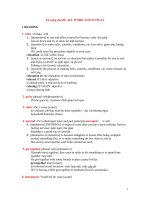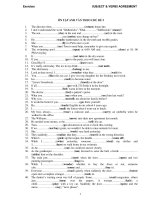Toeic theo chủ đề 5 doc
Bạn đang xem bản rút gọn của tài liệu. Xem và tải ngay bản đầy đủ của tài liệu tại đây (66.38 KB, 6 trang )
12 TOEFL EXAM ESSENTIALS
comfortable for you. A corner of your bedroom, a study in your
home, the local library, or your school are all possibilities. Once
you have a place to work, collect the study tools you will need.
With study tools in hand and a place to study, it’s time to col-
lect the information you need to make decisions about what to
study and how much time to allocate to each area of study.
Follow these five steps to create an effective study plan:
1. Get the information you need. Find out the details
about the TOEFL exam, including:
When will it be held?
Where is the test center nearest you?
How do you register?
What do you need to register?
How much does it cost?
What You Need Before You Start
To make your TOEFL exam study time more effective, get
the right study tools. Here are some suggestions:
■
a good English-language dictionary, such as Merriam-
Webster’s Collegiate Dictionary, 11th Edition
■
paper or legal pads
■
pencils or pens
■
highlighter pens in different colors
■
index or note cards
■
notebooks and folders
■
calendar or Personal Digital Assistant, such as a Palm
Pilot™
HOW TO USE THIS BOOK TO GET A TOP SCORE 13
What do you need to bring with you on exam day?
What exactly will be tested on the exam?
Some of this information is covered in this chapter
and in Appendix A at the back of the book. For more
information, you may need to contact your nearby test
center or university or go to www.toefl.org.
2. Find out what you already know and what you
need to learn. For your study plan to be useful, you
need to decide which subject areas require the most of
your attention. Take a practice TOEFL exam. Your
score will show both your strengths and the areas in
which you need improvement.
3. Set a time frame. Now that you know where to focus
your study, you can decide how much time you can
give to each subject area. First write down a list of
specific study goals. Be realistic—try to make goals that
you can accomplish. Now use a calendar to set
deadlines for these goals. Break up your studying into
small time blocks so you can reach your goal one step
at a time. Avoid making goals that are too big and too
general—for example, “Learn everything by May 1.”
Instead, set dates to learn material throughout March
and April and your study plan will enable you to learn
everything by May 1. For example, if you have three
months for test preparation and need to focus on
building your reading comprehension skills, you might
create a schedule like the one on the next page.
In this study plan, the first five weeks focus solely on
reading comprehension. However, the plan also allows
for time to study other test materials and complete an
14 TOEFL EXAM ESSENTIALS
overall review before the exam day. It sets specific weekly
goals as well as smaller, daily goals.
4. Stick to your plan. Write it down and post it where
you can see it. Unexpected events—such as coming
down with the flu or a problem at work—may interrupt
your plans. Don’t waste time worrying—just pick up
Week 1 Review basic reading comprehension
strategies. Start vocabulary list.
Week 2 Practice vocabulary in context questions and
specific detail questions.
Week 3 Practice inference questions.
Week 4 Practice finding references.
Week 5 Take reading comprehension practice test.
Week 6 Review grammar and usage rules. Start
reading novel.
Week 7 Continue reviewing grammar and usage
rules.
Week 8 Take structure practice test. Finish novel.
Week 9 Review writing strategies. Write a practice
essay.
Week 10 Write two more practice essays.
Week 11 Start overall review.
Week 12 Continue overall review until test day.
Every day: Read several articles in an English-language
newspaper.
Every week: Watch or listen to a TV show, news program,
or movie in English to build listening skills.
HOW TO USE THIS BOOK TO GET A TOP SCORE 15
where you left off. Try to put in extra time during the
next few weeks to catch up. You may need to adjust
your schedule to make deadlines more realistic, but be
sure to give yourself enough time to finish everything
before the exam.
5. Modify your plan. Most likely, you will need to adjust
your study plan as you proceed. Review your progress
every week. Did you reach your goals? If not, where
did you fall short and why? The more you assess what
is working in your plan and what is not working, the
more it will address your actual study needs.
It may go without saying, but the key element to doing well
on the TOEFL exam is mastering the material covered on the
test. Proficiency in English-language skills is crucial for success.
How can you best improve your listening, grammar, reading, and
writing skills? Knowing how to study can be as important as how
much time you spend studying. Effective study strategies are
active rather than passive, meaning that you do something, such
as the following:
■
Ask questions as you study, read, or listen to a
conversation in English.
•
What is the main idea being expressed?
•
What is the author or speaker trying to prove?
•
What is fact and what is opinion?
■
Locate what is important. As you read, use a high-
lighter or pencil to underline key information, such as:
•
terms that are defined in the text
•
main ideas
16 TOEFL EXAM ESSENTIALS
•
words or grammar rules you want to remember
•
new ideas
•
vocabulary words or expressions you need to look up
■
Make connections. If you can make connections
between ideas, you will better remember the material.
For example, if Spanish is your native language, you
might connect the word dormir (“to sleep” in Spanish)
with dormitory (the English word for a room or building
where students sleep).
■
Make notes. Note taking can help you remember
material, even if you never read your notes again. That’s
because it’s a muscle activity, and using your muscles
helps you remember. While reading or listening, make
note of main ideas, supporting details, authorities,
opinions and facts, and key terms.
BEAT TEST STRESS
Your palms sweat, your breathing quickens, and your heart races.
Most test takers recognize these common symptoms—the signs
of stress. However, by following a study plan and taking concrete
actions to reduce the stress in your life, you can boost your con-
fidence on exam day and lower your test stress.
Keep your general stress levels low. Take note of the factors
in your life that cause you stress, such as family, work, or school
problems. Try to deal with those stresses that interfere with
studying and preparing for the exam. For example, if you can’t
study at home because it is loud or chaotic, make plans to find a
quieter, calmer location like a friend’s house or the library. Taking
HOW TO USE THIS BOOK TO GET A TOP SCORE 17
specific actions can help you limit stress. The result will be that
you will feel more relaxed when you sit down to take the exam.
Here are seven ways to better handle stress.
1. Get plenty of sleep. Most adults need seven to nine
hours of sleep a night. Being deprived of sleep will
make you less able to cope with stress, less able to
concentrate, and less likely to perform well. If you have
a hard time falling asleep, try these tips:
■
Keep a regular schedule. Go to sleep and get up at
the same time every day.
■
Take a relaxing bath or read a book.
■
Stay away from caffeine after lunchtime (coffee, tea,
cola, and chocolate may contain caffeine).
■
Exercise earlier in the day (at least two to four hours
before bedtime). A tired body will need more sleep
(but a workout just before bed will keep you awake).
2. Eat well and exercise. Good nutrition and regular
exercise are important for your complete health. Stay
away from high-sugar, high-calorie, low-nutrition
snacks and meals. Instead of donuts, potato chips, or
cookies, for example, try low-fat yogurt, fresh-squeezed
fruit juice, or carrot sticks. Also, try to fit some exercise
into your busy schedule—even a brisk walk can
improve your mood, reduce stress, and boost your
energy level.
3. Study. Review and improve your skills ahead of time
and you will feel calm and confident when you walk
into the testing room. If you fall behind in your study
plan, do not worry—just try to get back on schedule.









